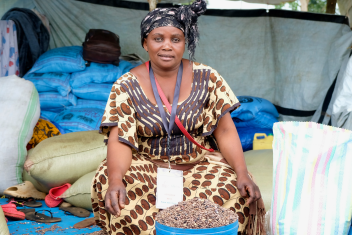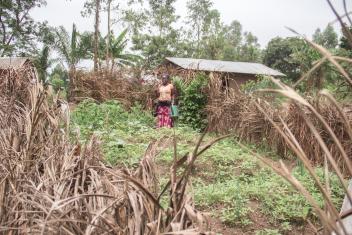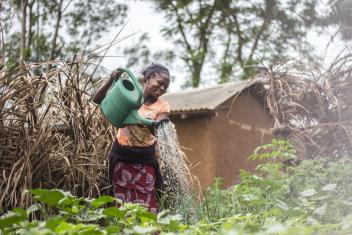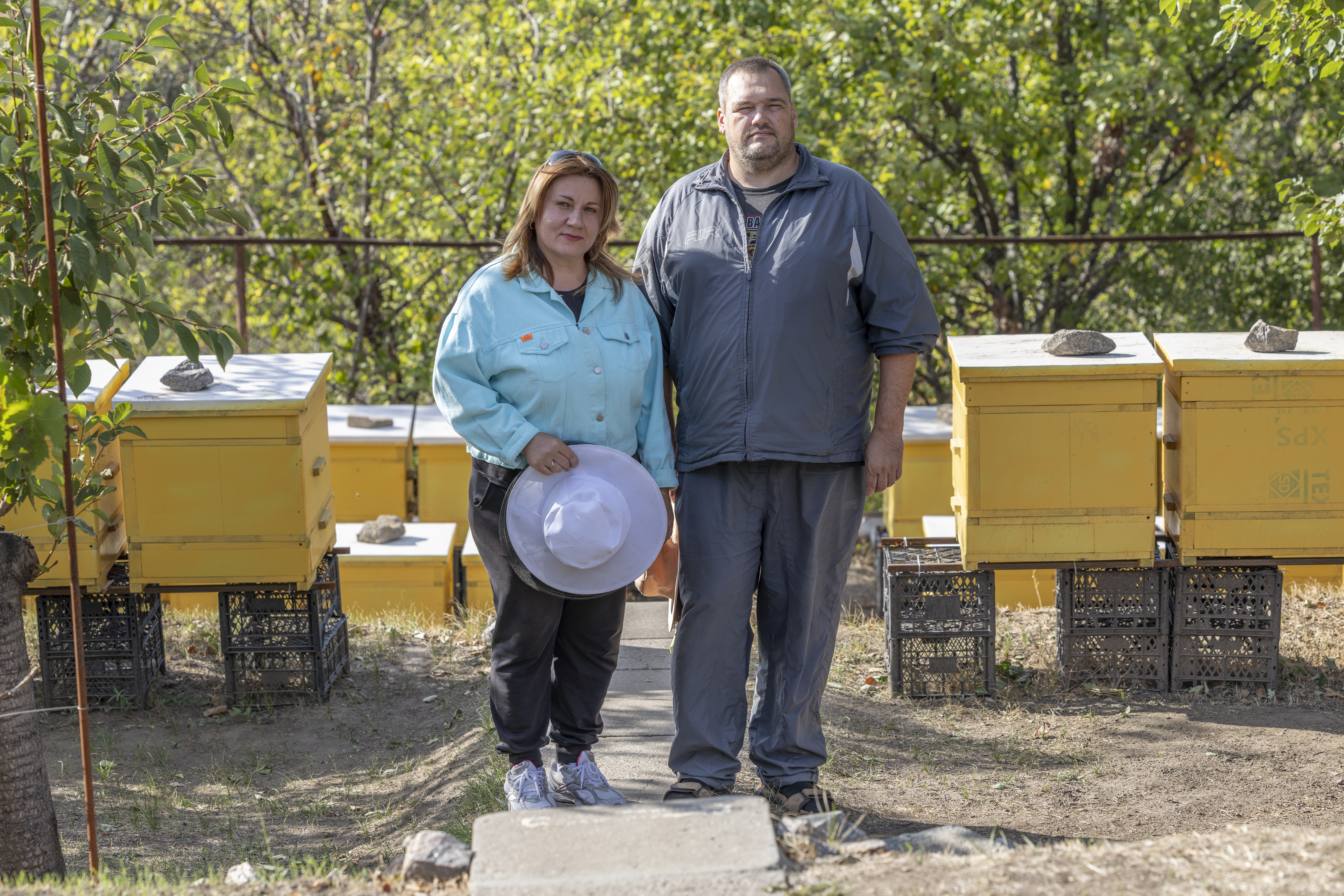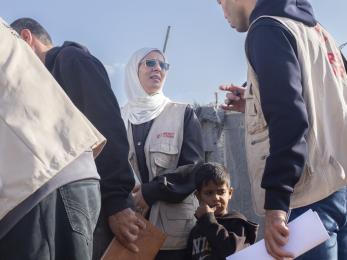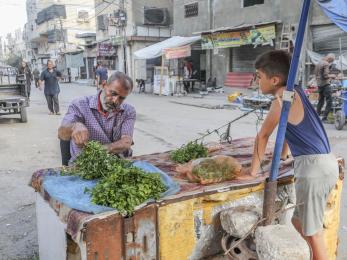Cultivating solutions to hunger for families affected by conflict
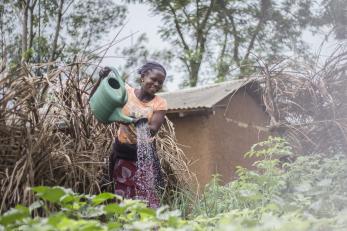
At just 24 years old, Grace Ganisikale knows what it is like to rebuild her life from scratch. In April 2021, violence broke out in her home of Nyankunde, forcing Grace and thousands of others to flee into the hills seeking safety. In the chaos, she was separated from her family members. “We all fled in different directions,” said Grace, who escaped towards neighbouring Komanda with her two young children.
In September, the violence reached Komanda. Again, Grace fled with her kids, but this time in the direction of their hometown. There she was reunited with her extended family, many of whom had been gradually returning to Nyankunde as the security situation settled.
The relief of their reunion was soon overshadowed by worry as the family, cut off from their fields due to continued insecurity, grew weak from hunger.
“Our life before was based on our fields. We ate and traded based on the manioc, sweet potatoes, and bananas that we grew there. When we came back, we were too afraid to go into the fields because there was still insecurity. Our houses were also looted. We had nothing. We were really hungry,” said Grace.
Grace and her family were among more than 6,000 households that fled violence in Komanda and Makayanga in September 2021 in the direction of Nyankunde, where Mercy Corps was already assisting more than 28,000 people who were returning from the April 2021 violence. This new wave of displaced people doubled the population size and increased the severity of food and water shortages.
Addressing a double strain on water supplies
Christine Maikolu also fled her village in Komanda when the violence broke out in September. “When we arrived here, my children started having diarrhea and vomiting, with chills and fever at night,” she said. She showed us the classroom where she and her young children sleep at the Marabo center.
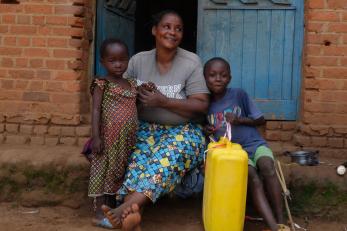
Mercy Corps assessed that more than 85% of newly displaced families reported that their children had experienced diarrhea since fleeing the area. To rapidly respond to the prevalence of waterborne illnesses, Mercy Corps (supported through USAID's Bureau for Humanitarian Assistance) set up two water tanks to provide clean water to 43,000 people. Once these emergency tanks were established, Mercy Corps rehabilitated existing water points, constructed public latrines and showers, distributed hygiene kits, and provided community activities to promote improved hygiene. This work resulted in a 77% decrease in diarrhea among children under five.
“Children's health has improved. We thank Mercy Corps for helping us with the water. The biggest challenge we have now is hunger,” Christine said.
Families caught in a vicious cycle of displacement and hunger
Nearly 27.3 million people in DRC are acutely food insecure — the country has the largest number of people in urgent need of food security assistance in the world. In Ituri province, where Mercy Corps’ emergency programme is providing lifesaving assistance, more than 1.7 million people are displaced and nearly half of the population face critical levels of hunger. Displaced families are among the most vulnerable, as insecurity and active violence prevent them from accessing their fields, food, and livelihoods. Although displaced families often have the chance to stay with host families, their presence reduces food and water supplies, adding pressure on local communities and increasing the needs of the entire population.
“The families displaced from Komanda came here to seek shelter although we had just returned home and had no food or water for ourselves,” said Badouin Emberamu who lives with his wife Marie and their grandchildren. They too returned to find their house and fields pillaged.
Given the acute levels of food insecurity in Nyankunde, Mercy Corps launched two additional emergency intervention programmes. “Our rapid response program, SAFER, provides lifesaving emergency assistance in recognition that families displaced by or returning from conflict have often abandoned everything they own and have very limited access to food, water, clothing, and basic household items,” said Trisha Bury, who served as Mercy Corps’ Emergency Programme Director in DRC.
Meeting hunger with immediate relief and longer-term agricultural solutions
In Nyankunde, Mercy Corps’ SAFER project helped secure food and essential household items, reaching more than 9,500 families.
“During Mercy Corps’ first intervention, we prioritised the purchase of a mattress, because until then we were all sleeping on the floor. We also took beans, oil, and soap, which we share with the family that is hosting us,” said Badouin.
Despite a first round of rapid life-saving assistance, the food security needs of families reliant on farming remained high, with many still cut off from their fields. Mercy Corps continued to help by providing interim assistance through a programme called “PHASE,” to ensure families had a predictable supply of nutritious food until they were able to restart their livelihood or farming activities. The programme also provided alternative agricultural solutions for families to create permanent food supplies, plus access to markets through “food fairs.”
These fairs, in which participants receive vouchers to purchase supplies for their families, aim not only to meet the immediate needs of the target population, but also to stimulate economic recovery by supporting local markets and vendors. Food fairs organised by Mercy Corps in collaboration with local vendors in the Nyankunde area reached more than 57,000 people, including Steven Baraka, whose father was killed in the April 2021 violence. Steven has been slowly rebuilding the family’s butcher shop since his return to Nyankunde.
“When we arrived home we found our houses burned and our livestock looted. We had no way to make a living,” said Steven. With little revenue circulating in the local economy, it has been difficult for him to pick up business. As both a participant and a vendor, he is able to meet his family’s immediate needs and boost his income to start reinvesting in his family’s future.
“Since Mercy Corps assisted us, we have food in our houses — beans, rice, oil. Conditions have improved. At the Mercy Corps fairs, I can sell three cows a day, which is much more than I can sell outside the fair. With my profit I plan to build even a small house for my family, because since we returned home we have been living in difficult conditions,” he said.
For Grace, whose family is still cut off from their fields due to insecurity, Mercy Corps has provided both supplies and skills. “Today I took rice, beans, oil and salt,” says Grace, carrying home the food supplies she selected at the final fair. Seven months after their return home, Grace and her family are now able to get by on vegetables grown much closer to home.
“Mercy Corps came to train us on permagarden techniques. They showed us how to properly fertilise the soil, plant vegetables with techniques that don't require a lot of water, so that even in the dry season we have vegetables to eat close to home,” said Grace, whose family is one of 528 that was trained in permagarden techniques through neighbourhood demonstration plots. To kickstart the garden, she received gardening tools and vegetable seeds.
Grace says she has seen an improvement in her children’s health now that they are eating multiple times per day. “In our garden now we have amaranth, leek, squash, and spinach. It helps us for survival. We eat vegetables regularly now, which helps us not just survive but also live better.”
Read the original French language version on our DRC website ▸
